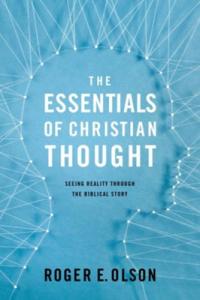Essentials of Christian Thought: Chapter Four: Non-Biblical, Non-Christian Views of Reality
My purpose in this chapter (and the interlude that follows) is to warn against syncretism among Christians. Here I describe a number of major metaphysical views of reality that are antithetical to the biblical story of God and to historic, classical Christianity. Among them are: monism (and its variations including emanationism), dualism (Manichaeism), naturalism and panentheism. All are pernicious especially when adopted into Christianity, something which I have observed and experienced during my many years of teaching Christian theology in churches and institutions of higher education. One not mentioned above is deism, now often called (when it appears among Christians) “moralistic, therapeutic deism.” Especially during the so-called New Age Movement (1990s) I encountered many church members who had adopted various aspects of that spiritual movement, especially some vague idea that the human spirit is “at one” with the divine Spirit and that salvation is simply a realizing and actualizing of one’s “inner divinity.”
I fully realize that some adherents of these non-biblical, non-Christian worldviews will object, possibly even be offended, by my rejections of them and by my explanations of that. All I can say is, please remember that I am a Christian theologian writing this book for Christians. Especially for confused Christians who have adopted non-biblical, non-Christian visions of reality and syncretistically incorporated them (usually not in whole but in parts) into their Christian life and worldview.
In the interlude I reveal my own antipathy to aspects of Greek philosophy that crept into Christianity very early, even in the second century with the so-called “Apologists.” My main concern there is that, over the centuries of Christian teaching, far too much of Greek “perfect being ontology” has been adopted into Christian theology. One main example is the idea that God is incapable of having emotions or of experiencing new things. I especially object to the idea of God as “pure actuality without potentiality.” The biblical God is a passionate God who interacts with the world, with people, and has potential in his eternal, unchanging nature and character. I mean that the God of the Bible experiences new feelings and new experiences that he would not have had without a world.
I realize that that interlude will inevitably upset some conservative Christians, especially some teachers of theology who are of the “back to the church fathers” mindset. But I am asking them to reconsider their adoption of Greek “perfect being ontology” insofar as it causes them to think or teach about God as immutable (other than ethically immutable). Think about prayer; can prayer affect God? Or do prayers simply bounce off of God, having no real effect on him or in him? What about the story of King Hezekiah and his prayer for longer life and God’s gift of longer life after the prophet of God had told him he was about to die? Did his prayer not change what was going to happen? The biblical narrative certainly implies that prayer can do that.
*Note: If you have read this chapter and interlude, feel free to comment and/or ask a question. If you have not read them, please only ask a question; don’t comment. Let all comments and questions be relatively brief (no more than 100 words), on topic, addressed to me, civil and respectful (not hostile or argumentative), and devoid of pictures or links.*














